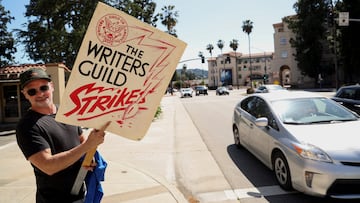What TV shows could be hit the hardest by the writers’ strike?
Late-night TV will be going dark until a labor dispute between Writers Guild of America and Hollywood studios is resolved. More shows could be affected too.

Just after midnight on Tuesday 2 May, the Writers Guild of America began its largest strike in 15 years when the current guild contract expired. The WGA had been in negotiations with the Alliance of Motion Picture and Television Producers (AMPTP), which represents Hollywood studios, over the past week but they failed to reach an agreement.
The first programs to be affected by the strike were late-night shows including ‘Jimmy Kimmel Live!,’ ‘Late Night With Seth Meyers,’ ‘The Tonight Show Starring Jimmy Fallon,’ and ‘The Late Show With Stephen Colbert’ which have all paused production and will not air reruns. ‘The Daily Show,’ ‘Last Week Tonight With John Oliver’ and ‘Real Time With Bill Maher’ will also be affected along with ‘Saturday Night Live.’ However, reruns will be broadcast according to Screenrant for the time being while the guild writers are on strike.
Does Stephen Colbert support the writers strike?
— More Perfect Union (@MorePerfectUS) May 2, 2023
Oh yeah. pic.twitter.com/Xt2gAWtp0u
Depending on how long the strike continues, the next to go dark or have to show reruns would be soap operas. An if it goes on for an extended amount of time other shows could see release delays or the number of episodes reduced for next season. This could include ‘Abbot Elementary,’ ‘Cobra Kai’ and ‘Stranger Things’ whose epic conclusion was scheduled for release in 2024.
What are the WGA demands?
One of the main demands from the striking writers is for higher pay as many find it difficult to afford to live in expensive cities like Los Angeles and New York. AMPTP says that it has offered “generous increases in compensation” which it is willing to increase further.
According to WGA, the median number of TV series writers working at the minimum salary has gone from a third in the 2013-14 season to half nowadays. Median weekly pay for writer-producers has decreased by 4 percent over the last decade, when adjusted for inflation it’s a decline of 23 percent.
Actor Rob Lowe joins his son, writer John Owen Lowe, on the picket lines as film and television writers went on strike taking their demands for higher pay to the doors of major studios. More here: https://t.co/ETBhRCet6R pic.twitter.com/oL46iTVVRH
— Reuters (@Reuters) May 3, 2023
Related stories
Streaming has dramatically disrupted the industry with ad revenue shrinking as well as traditional audiences. At the same time Wall Street wants streaming platforms to become profitable after conglomerates pumped billions into programming in a bid to attract subscribers.
AMPTP objects to a guild demand that shows be staffed with a certain number of writers, whether needed or not, for a specific period of time. Also on the bargaining table is artificial intelligence (AI). The WGA is calling for protections to prevent studios from requiring writers to rewrite drafts generated by AI or companies using AI generated scripts from writers’ previous work.


